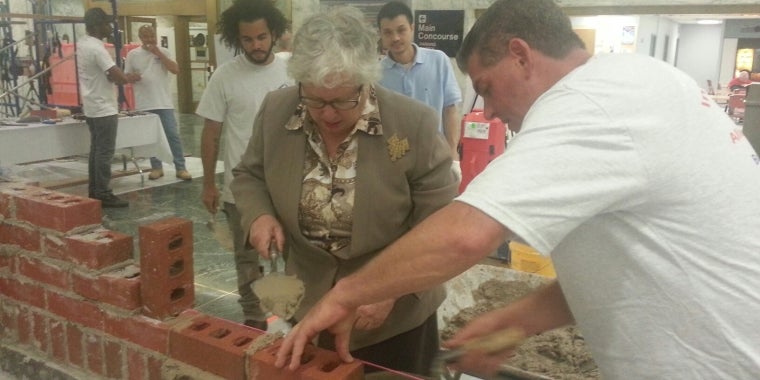
Senator Tkaczyk, Assemblywoman Gunther Fight for Community-Based Mental Healthcare
June 13, 2013
-
ISSUE:
- Mental Health

(ALBANY, NY) -- Although community mental health needs are at an all-time high, funding for those programs has been diverted to the General Fund for ten of the last 20 years. State Senator Cecilia Tkaczyk (ranking member of the Senate Mental Health Committee) and Assemblywoman Aileen Gunther (chair of the Assembly Mental Health Committee) have introduced legislation to address that lack of funding and the current critical shortage of community-based services.
The Tkaczyk/Gunther measure would work hand-in-hand with the NYS Office of Mental Health’s proposed “Regional Centers of Excellence,” which will greatly reduce the number of psychiatric centers. Their measure would ensure the transition to regional hospital centers is accompanied by an appropriate plan, with proper funding, to provide the necessary community-based services.
Based upon the landmark “Community Mental Health Reinvestment Act”, of 1993, the “Communities of Excellence Mental Health Reinvestment Act,” (S5631a/A7842a) is moving through the Assembly, and the two legislators, joined by mental health advocates from across New York State, called on Senate Leaders to take up the bill before the end of session.
Senator Tkaczyk said, “Right now, tens of millions of dollars are tied up in unused or under-utilized bricks and mortar psychiatric hospital facilities. The proposed Regional Centers of excellence will reduce the bricks and mortar hospitals, but the money saved needs to be kept in the mental health system. By reinvesting these funds in community based services, we will be reaching people in the communities where they live, in far less costly community-based mental health services.”
Assemblywoman Gunther said, "While the Office of Mental Health's plan to create regional Centers for Excellence is laudable, and in many ways, necessary, we also have a responsibility to ensure that people that need community-based services receive them. There is not an advocate standing here today that will not tell you that keeping people with mental illness healthy, that providing them with the services they need in the community, is not only better for the person and their family, but is significantly less expensive. Providing 50% of the savings the state will realize toward the development of community-based services is responsible. It's necessary. And it's the right thing to do."
Deinstitutionalization began in the NYS psychiatric hospital system in the early 1960s. At the time, there were 90,000 people making up the in-patient psychiatric hospital system in our state. By 1978, the inpatient population had been reduced to just 30,000.
However, community-based services were not developed, and funding did not follow the 60,000 or so patients from the hospital into the community to meet their needs. Another 15 years passed, and another 12,000 to 15,000 people returned to the community before the Legislature acted.
In 1993, New York enacted the Community Mental Health Reinvestment Act, which was the most significant reform in the state's mental health care system in decades. It has been acclaimed by mental health advocates, recipients, employees, providers, and administrators alike.
The basic principle behind this landmark legislation is that savings realized from closing and downsizing state facilities were to be reinvested into building and maintaining community-based services.
Unfortunately, there has been a reduced commitment to Reinvestment in at least ten of the 20 years since passage of the Act, including 2002, when Governor Pataki vetoed the bill extending Reinvestment and all funds associated with those savings. In all, hundreds of millions of dollars have been lost from community-based services through “notwithstanding language” which allowed the money saved to be swept into the general fund, and diverted from mental health services.
The following mental health experts and advocates voiced their support for the Tkaczyk/Gunther proposal:
Harvey Rosenthal, executive director of the New York Association of Psychiatric Rehabilitation Services (NYAPRS) said, “During the 1990's, New York's Community Mental Health Reinvestment program played an historic role in helping localities to ramp up their local mental health service systems and advance the recovery of hundreds of thousands of New Yorkers with psychiatric disabilities. We are extremely grateful to Senator Tkaczyk and Assemblywoman Gunther for their proposal to renew the state's commitment to 'keep the promise' of recovery.”
Amy Colesante, executive director of Mental Health Empowerment Project, Inc, said, ““Peer run services are groundbreaking programs that are valuable, efficient and cost effective with demonstrated outcomes. The “Communities of Excellence Mental Health Reinvestment Act” would ensure proper funding to allow for the continuation and expansion of these innovative programs.”
Maura Kelley, Director of Mental Health Peer Connection, in Buffalo, NY, and Co-president of the NYAPRS, said, “Thanks to previously authorized Reinvestment funds, Buffalo’s Mental Health Peer Connection saved New York State $50 million in just the last year alone, by helping to prevent the avoidable re-institutionalization of 420 people with psychiatric disabilities. With approval of the Tkaczyk-Gunther proposal to restore Reinvestment, many more people will be helped and many more public dollars will be saved.”
Antonia Lasicki, executive director of the Association for Community Living, said, “We applaud and support Senator Tkaczyk and Assemblywoman Gunter for introducing the Communities of Excellence Mental Health Reinvestment Act. There currently are just over 3,000 individuals being served in the state hospital system and we can easily meet the needs of individuals requiring an inpatient stay with fewer facilities. We have come far in creating community based services and treatment advances that allow most with a severe mental illness to remain integrated in communities and be productive members of society.”
Glenn Liebman, CEO Mental Health Association in New York State, said, “2013 marks the 20th anniversary of the Community Mental Health Reinvestment Act. Taking the money from the closing and downsizing of psychiatric hospital beds and reinvesting it into the community helped to create new and innovative programs, housing and strong involvement from stakeholder groups. We applaud Senator Tkaczyk and Assemblywoman Gunther for introducing legislation designed to help people with psychiatric disabilities recover in the community.”
Paige Pierce, executive director of Families Together in NYS, representing families of children who are in one or more of our state systems, said, "We know that our children can be served better in cost-effective, community-based programs. But in order to realize this, we must invest in these programs or they will not be available as an alternative to institutional settings. The lack of Community-based services leaves families with no other choice than the costly residential settings that we are trying to reduce."
Carla Rabinowitz is co-chair of NYAPRS Public Policy committee and a community organizer at Community Access, a nonprofit leader in NYC that helps mental health recipients attain affordable housing and support services. Carla said, “From personal experience, I know that living in a hospital – with the loss of dignity that entails – is harsh. To function in society, mental health recipients, like everyone else, need a home and a job. Quality housing and peer employment rebuild lives and is far cheaper than the cost of even short hospital stays. Thanks to this proposal from Assemblymember Gunther and Senator Tkaczyk, more mental health recipients can rebuild their lives through peer employment and supportive housing and avoid costly and dignity-stripping hospital stays.”
Share this Article or Press Release
Newsroom
Go to NewsroomCelebrating Greene County Older Americans Month
June 18, 2014

